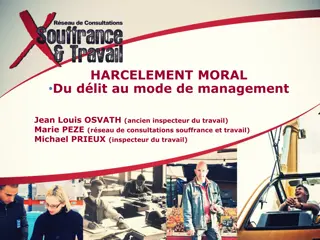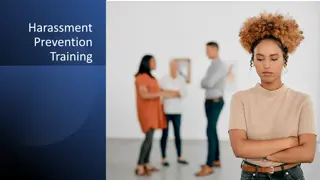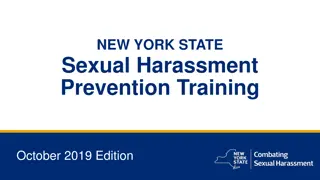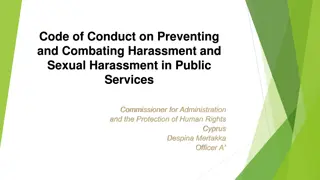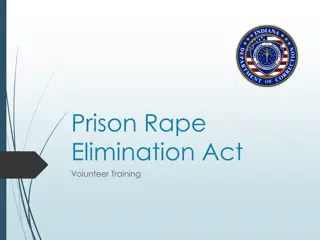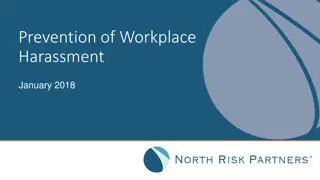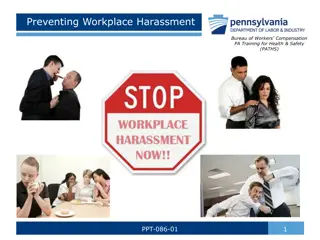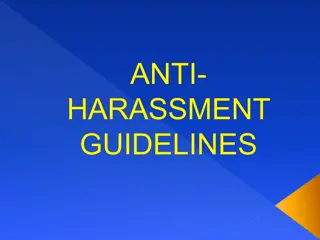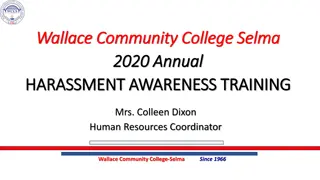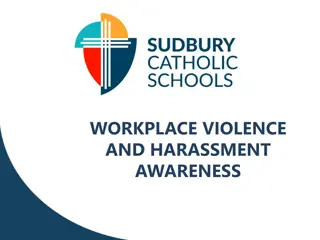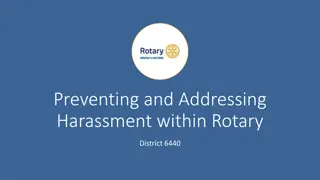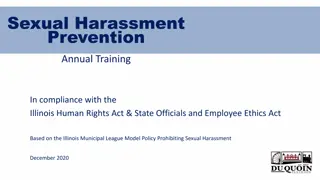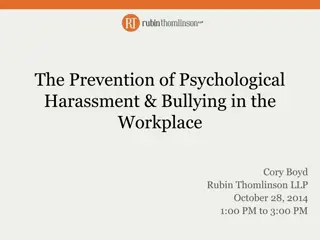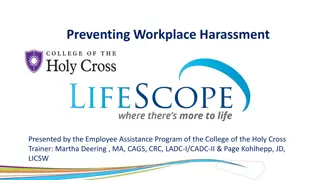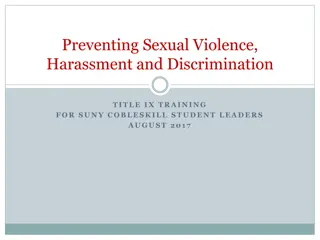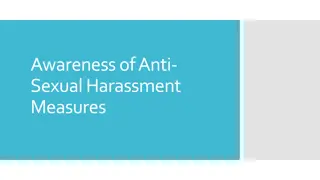Guidelines for Preventing Abuse and Harassment in District 6510
District 6510 is dedicated to ensuring the safety and well-being of all participants by maintaining a zero-tolerance policy towards abuse and harassment. The Rotary International's policy emphasizes creating a harassment-free environment where dignity and respect are prioritized. Harassment is broadly defined, and any inappropriate behavior, including harassment, is promptly addressed without retaliation. Definitions of emotional, verbal, physical abuse, neglect, sexual abuse, and harassment are outlined to guide appropriate responses within the community.
Download Presentation

Please find below an Image/Link to download the presentation.
The content on the website is provided AS IS for your information and personal use only. It may not be sold, licensed, or shared on other websites without obtaining consent from the author. Download presentation by click this link. If you encounter any issues during the download, it is possible that the publisher has removed the file from their server.
E N D
Presentation Transcript
Abuse and Harassment District 6510
Overview District 6510 is committed to protecting the safety and well-being of all program participants and will not tolerate abuse or harassment. All allegations will be taken seriously and must be handled within the following guidelines. The safety and well-being of program participants must always be top priority. Applies to Adult and Youth Participants
Rotary International Policy on Adult Harassment 26.120 Harassment-Free Environment Rotary is committed to maintaining an environment that is free of any form of harassment. All members and individuals attending or participating in Rotary meetings, events, or activities should expect an environment free of harassment , including unwelcome physical contact, advances, or comments. Members and Rotary participants shall maintain an environment that promotes safety, curtesy, dignity, and respect to all.
Rotary International- Harassment Defined Harassment is broadly defined as any conduct, verbal or physical, that denigrates, insults or offends a person or group based on any characteristic (age, ethnicity, race, color, abilities, religion, socioeconomic status, culture, sex, sexual orientations, or gender identity). The club board, district, or zone event leadership shall promptly address allegations of inappropriate behavior, including harassment and shall not retaliate against those making the allegation. All allegations of criminal behavior must be referred to local law enforcement.
Definitions Emotional or verbal abuse The use of fear, humiliation, or verbal assaults to control the behavior of another. Examples include rejecting the person, preventing him or her from developing normal social relationships, and making derogatory statements about his or her race, religion, ability, intellect, tastes, or personal appearance. Physical abuse Physical contact intended to cause pain, injury, or other physical suffering or harm. Neglect Failure to provide the food, shelter, or medical care that is necessary to well-being.
Definitions Continued Sexual abuse Engaging in or arranging implicit or explicit sexual acts, whether they are performed alone or with another person of any age or gender, through force or coercion or with anyone who is unable to give consent. Any sexual activity between a legal adult and a minor is considered sexual abuse. Sexual abuse can also include non-touching offenses, such as voyeuristic behavior, indecent exposure, or showing a young person sexual or pornographic material. Sexual harassment Sexual advances, requests for sexual favors, or verbal or physical conduct of a sexual nature that is unwanted or directed at someone unwilling or unable to provide consent. In some cases, sexual harassment precedes sexual abuse and is used by sexual predators to desensitize or groom their victims. Examples of sexual harassment include: Sexual epithets or jokes, written or spoken references to sexual conduct, gossip about one s sex life, and comments about a person s sexual activity, deficiencies, or prowess Verbal abuse of a sexual nature Display of sexually suggestive objects or images Sexual leering or whistling Inappropriate physical contact, such as brushing against a person Obscene language or gestures, and suggestive or insulting comments
Conducting Club Meetings Recognizing that clubs include members who have many beliefs and values, each club should use good judgment in conducting meetings, events and other activities in a manner that reflects Rotary's basic principles of tolerance, providing a harassment-free environment to all participants, and focus on humanitarian service projects.
Decorum Of Club Any conduct, story, stunt, joke, or entertainment, whether verbal or physical, that denigrates, insults or offends a person or group based on any characteristic (age, ethnicity, race, color, abilities, religion, socioeconomic status, culture, sex, sexual orientations, or gender identity) is not appropriate for a Rotary club/district/zone meeting, event or activity.
Rotarian Code of Conduct The following code of conduct has been adopted for the use of Rotarians: As a Rotarian, I will 1) Act with integrity and high ethical standards in my personal and professional life 2) Deal fairly with others and treat them and their occupations with respect 3) Use my professional skills through Rotary to: mentor young people, help those with special needs, and improve people s quality of life in my community and in the world 4) Avoid behavior that reflects adversely on Rotary or other Rotarians 5) Help maintain a harassment-free environment in Rotary meetings, events, and activities, report any suspected harassment, and help ensure non-retaliation to those individuals that report harassment.
Club Level Response At the club level, allegations of harassment at Rotary events or activities shall be reviewed by the club board and responded to within a reasonable timeframe, typically one week. If the alleged offender is a member of the club board, he or she is expected to recuse himself or herself from the discussion. Failure to adequately address allegations of harassment may be referred to the district governor.
Rotary Constitution-Termination for Other Causes (Abuse or Harassment) Good Cause. The board may terminate the membership of any member who ceases to have the qualifications for membership in the club or for any good cause by a vote of not less than two-thirds of the board members present and voting, at a meeting called for that purpose. The guiding principles for this meeting shall be article 10, section 1; The Four-Way Test; and the high ethical standards that one should hold as a Rotary club member. Notice. Prior to taking any action under subsection (a) of this section, the member shall be given at least ten (10) days written notice of such pending action and an opportunity to submit a written answer to the board. The member shall have the right to appear before the board to state the member s case. Notice shall be by personal delivery or by registered letter to the member s last known address.
Continued-Right to Appeal, Mediate or Arbitrate Termination Notice. Within seven (7) days after the date of the board s decision to terminate or suspend membership, the secretary shall give written notice of the decision to the member. Within fourteen (14) days after the date of the notice, the member may give written notice to the secretary of the intention to appeal to the club, request mediation, or to arbitrate as provided in article 19. Date for Hearing of Appeal. In the event of an appeal, the board shall set a date for the hearing of the appeal at a regular club meeting to be held within twenty-one (21) days after receipt of the notice of appeal. At least five (5) days written notice of the meeting and its special business shall be given to every member. Only members shall be present when the appeal is heard. Mediation or Arbitration. The procedure utilized for mediation or arbitration shall be as provided in article 19. Appeal. If an appeal is taken, the action of the club shall be final and binding on all parties and shall not be subject to arbitration. Decision of Arbitrators or Umpire. If arbitration is requested, the decision reached by the arbitrators or, if they disagree, by the umpire shall be final and binding on all parties and shall not be subject to appeal. Unsuccessful Mediation. If mediation is requested but is unsuccessful, the member may appeal to the club or arbitrate as provided in subsection (a) of this section.
Continued-Final Action, Resignation, Forfeiture of Property Board Action Final. Board action shall be final if no appeal to this club is taken and no arbitration is requested. Resignation. The resignation of any member from this club shall be in writing, addressed to the president or secretary. The resignation shall be accepted by the board if the member has no indebtedness to this club. Forfeiture of Property Interest. Any person whose club membership has been terminated in any manner shall forfeit all interest in any funds or other property belonging to this club if, under local laws, the member may have acquired any right to them upon joining the club.
Temporary Suspension Credible accusations have been made that a member has refused or neglected to comply with this constitution, or has been guilty of conduct unbecoming a member or prejudicial to the interests of the club; and Those accusations, if proved, constitute good cause for terminating the membership of the member; and It is desirable that no action should be taken in respect of the membership of the member pending the outcome of a matter or an event that the board considers should properly occur before such action is taken by the board; and
Continued That in the best interests of the club and without any vote being taken as to his membership, the member s membership should be temporarily suspended and the member should be excluded from attendance at meetings and other activities of this club and from any office or position the member holds within the club; the board may, by a vote of not less than two-thirds of the board, temporarily suspend the member as aforesaid for a reasonable period of time not to exceed 90 days and on such further conditions as the board determines. A suspended member may appeal or refer to mediation or arbitration the suspension as provided in article 15, section 6. During the suspension, the member shall be excused from fulfilling attendance responsibilities. Prior to the expiration of the suspension period, the board must either proceed to terminate the membership of the suspended Rotarian or reinstate the suspended Rotarian to full regular status.
Receiving an Allegation Report Listen attentively and stay calm. Acknowledge that it takes courage to report abuse or harassment. Be encouraging, but remain neutral; do not express shock, horror, or disbelief. Assure privacy but not confidentiality. Explain that you will have to tell someone about the abuse or harassment to make it stop and ensure that it doesn t happen to others. Get the facts, but don t interrogate. Ask questions that establish facts: who, what, when, where, and how. Reassure the reporting party that he or she did the right thing in telling you. Avoid asking why questions, which may be interpreted as questioning the reporting person s motives. Remember that your responsibility is to report this information to the proper authorities. Be nonjudgmental and reassure. Avoid criticizing anything that has happened or anyone who may be involved. It s especially important not to blame or criticize the young person. Emphasize that it was not his or her fault and that it was brave and mature to come to you. Document the allegation. Record the conversation, including the date and time, as soon after the report as you can. Try to record the reporting person s exact words.
What if the report involves a minor? (Same) Protect the minor Report the allegations to the proper authorities Remove the accused person from contact with the minor Avoid gossip and blame Follow through Contact District Contact parents Document
A female member of a club tells you, her club president, that she was inappropriately touched by a man at a club event. She doesn't want to tell the board or local authorities about it. What is the best response? Thank her for confiding in you and ask what she hopes will be the result. Respect Her decision not to tell anyone else. Tell her that Rotary has no tolerance for harassing behaviors. Strongly advise her to talk to the local authorities and let her know you would like to conduct an investigation so this doesn t happen again.
A female regional leader sends you, an RI director, a message that says she was disrespected and defamed on social media by a governor-nominee during a Rotary Institute. She wants the governor-nominee to be reprimanded, ordered to apologize, and investigated to determine whether his is fit for office. What do you do? Conduct an investigation in which you review the social media post and interview the regional leader, the governor-nominee, the governor-elect, the current governor, and anyone else who was involved Contact the governor nominee and ask him to take the post down and apologize Ask to mediate a conversation between the regional leader and the governor- nominee to resolve the issue
A male member reports to you, a club president, that he was disrespected and publicly defamed by another member at a local Rotary event that you did not attend. He asks that this person be disciplined. What is your next step? Tell him that because you weren t there, you can t resolve the situation. Say that you will investigate and ask him to document the details, including the name of anyone else who witnessed the incident. Assure him that you will talk to the other person and tell them that such behavior isn t appropriate.
Your club invites a female member from another club to talk about a project. While she is speaking, a male club member makes derogatory comments and dismisses the ideas she is presenting. The club president asks him to be quiet, but he continues to mumble at his seat and disturb other members. The guest feels uncomfortable and ends her presentation early. As one of three men at the table with the man making derogatory comments, what is your response? deserve respect. Tell the man that you want to hear the presentation and that all speakers Do nothing. It is the club president s job to manage this type of behavior. and how Approach the man after the meetings and say that his behavior was disruptive unfair to the presenter. Ask what his complaint about the presentation was and he could have handled it differently.
A club member who belongs to the dominant ethnic group votes against admitting the first member from an unrepresented ethnic group, saying the prospective member is not welcome and threatening to leave the club if the person is admitted. At the next club meeting , which the new member attends, the longtime member won t shake the new members hand, refuses to speak to him , and starts talking to a friend about how the club's image has suffered since it started let them into the club. When the new member speaks, the longtime member makes negative comments. As a member of this club what do you do? Talk to the club president and say you feel that the longtime member is creating a hostile environment. Tell the longtime member that his comments are inappropriate and that you support having the new member as part of the club. Do nothing. It is the responsibility of the club s leaders or the board to intervene.
At the club level, allegations of harassment at Rotary meetings, events, or activities shall be reviewed by the club board and responded to within a reasonable time frame, typically one month. If the alleged offender is a member of the club board, he or she must recuse himself or herself from the discussion. The review and/or investigation shall be dependent on the circumstances including the severity and pervasiveness of the behavior. Concerns that allegations of harassment were not adequately addressed by the club may be referred with appropriate documentation to the district governor. At the district level, allegations of harassment at Rotary events or activities shall be reviewed by the governor, or a committee appointed by the governor for this purpose, and responded to within a reasonable time frame, typically one month. If the district governor is the alleged offender, the immediate past district governor (or most recent past governor), directly or by appointment of a committee for this purpose, shall review and respond to the allegation. The general secretary shall be informed within two weeks of any allegations of harassment by district governors, governors-elect, and governors-nominee. The review and/or investigation shall be dependent on the circumstances including the severity and pervasiveness of the behavior. Concerns that allegations of harassment were not adequately addressed by the district may be referred with appropriate documentation to the RI director.
District leaders, including governors, assistant governors, and committee chairs, are encouraged to work with their clubs to create a harassment-free environment. District leaders should also work with their clubs to establish a code of conduct and policies for how to address and prevent harassment within their clubs, among their members, and with other participants in Rotary.



